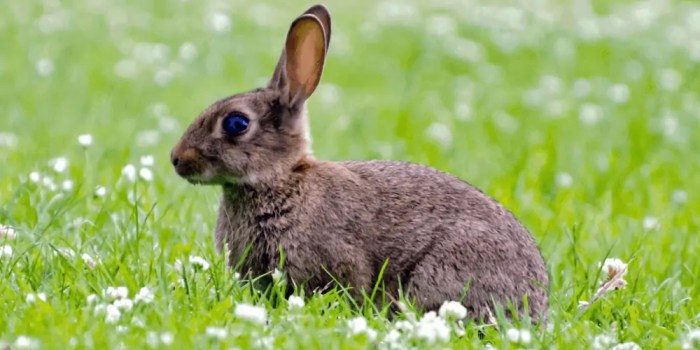Rabbits are fascinating creatures, and their reproductive system is no exception. Unlike humans, rabbits do not experience menstruation, but they do have a unique reproductive cycle that ensures the survival of their species. In this article, we will explore the intricacies of rabbit reproduction, examining the biological processes involved, understanding why rabbits don’t menstruate, and discussing the signs of heat, which is the rabbit equivalent of estrus.
We will also delve into the considerations for successful breeding, providing insights into the optimal breeding period and best practices.
Signs of Heat

Rabbits experience a unique reproductive cycle known as heat, which occurs every 10-14 days and lasts for approximately 3-5 days. During this period, female rabbits, called does, exhibit specific physical and behavioral changes that indicate their receptiveness to mating.
Physical Signs
Physically, a doe in heat may exhibit the following signs:
- Swollen and reddened vulva: The vulva, located just below the tail, becomes visibly swollen and red.
- Clear discharge: A clear, sticky discharge may be present around the vulva.
- Raised tail: The doe may hold her tail raised and to the side, exposing the vulva.
Behavioral Signs
Behaviorally, a doe in heat may exhibit the following signs:
- Increased activity: The doe may become more active and restless, running around the cage or hutch.
- Affectionate behavior: The doe may become more affectionate towards her owner, seeking attention and petting.
- Mounting behavior: The doe may mount other rabbits, both male and female, as a sign of dominance and receptiveness.
Distinguishing Heat from Other Conditions
It is important to distinguish heat from other conditions that may cause similar symptoms. These include:
- Uterine infection: A uterine infection can cause a bloody or pus-filled discharge, as well as swelling and pain in the abdomen.
- Ovarian cysts: Ovarian cysts can cause the vulva to become swollen and red, but they do not usually lead to clear discharge.
- Pregnancy: A pregnant doe may exhibit similar signs to heat, such as increased activity and a swollen vulva. However, a pregnancy test can be used to confirm pregnancy.
If you suspect that your doe is in heat, it is important to observe her closely for any signs of illness or discomfort. If you have any concerns, consult with your veterinarian for proper diagnosis and treatment.
Breeding Considerations
Breeding rabbits requires careful planning and consideration to ensure successful outcomes. Understanding the optimal breeding period and selecting compatible pairs are crucial factors for a productive breeding program.
Optimal Breeding Period
The optimal breeding period for rabbits is typically between 6 and 12 months of age. During this time, rabbits are sexually mature and have reached a suitable weight and size for breeding. Breeding outside of this period may result in smaller litter sizes or health issues for the offspring.
Pairing Considerations
When pairing rabbits for breeding, several factors should be taken into account:
- Compatibility: Rabbits should be compatible in terms of size, temperament, and health.
- Genetic diversity: Breeding rabbits from unrelated lines helps maintain genetic diversity and reduces the risk of inherited disorders.
- Health: Both male and female rabbits should be in good health before breeding to ensure healthy offspring.
Best Practices for Successful Breeding
To achieve successful breeding, several best practices should be followed:
- Proper environment: Provide a clean and spacious cage with adequate ventilation and a nest box for the female.
- Nutritional support: Ensure both rabbits have access to a nutritious diet that supports breeding and pregnancy.
- Monitoring: Observe the rabbits closely during breeding to ensure they are compatible and mating successfully.
- Record keeping: Maintain accurate records of breeding dates, pairings, and litter sizes to track progress and identify potential problems.
Last Word
Understanding rabbit reproduction is essential for responsible rabbit ownership. By comprehending the biological processes, hormonal factors, and behavioral signs associated with reproduction, we can ensure the well-being of our furry friends. Whether you are a seasoned rabbit enthusiast or a curious newcomer, this article has provided valuable insights into the fascinating world of rabbit reproduction.
Q&A
Do rabbits experience menopause?
No, rabbits do not experience menopause. They remain fertile throughout their lives.
Can rabbits get pregnant while they are nursing?
Yes, rabbits can become pregnant while nursing. This is known as postpartum estrus and can occur as early as 3 days after giving birth.
How long does a rabbit’s heat cycle last?
A rabbit’s heat cycle typically lasts for 10-12 days.
What are the signs that a rabbit is in heat?
Signs of heat in rabbits include restlessness, circling, mounting other rabbits, and a swollen and reddish vulva.